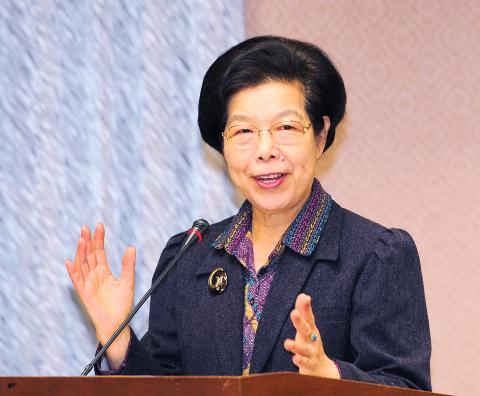President Ma Ying-jeou (馬英九) has nominated Central Election Commission (CEC) Chairperson Chang Po-ya (張博雅) to be president of the Control Yuan, looking to make her the first female head of one of the five branches of the government, local media reported last night.
Ma also nominated former Council of Indigenous Peoples minister Sun Ta-chuan (孫大川) as vice president of the Control Yuan, the government watchdog, local media reports said.
Chang is a veteran politician, having served as interior minister, Chiayi mayor, a legislator and minister of the now-defunct department of health.

Photo: Lo Pei-der, Taipei Times
The 71-year-old was designated CEC chairperson in 2010 and her term is due to expire on Nov. 3 this year.
If approved, Chang’s nomination would dash the renomination hopes of Control Yuan President Wang Chien-shien (王建煊), who has made several controversial remarks during his six-year tenure, such as describing college students who take on part-time work as “very stupid.”
Meanwhile, local media also reported that Wu Jin-lin (伍錦霖) has been promoted from vice president to Examination Yuan president, while Examination Yuan member Kao Yuang-kuang (高永光) has been appointed to succeed him.
A former secretary-general at the Presidential Office and a former deputy secretary-general of the Chinese Nationalist Party (KMT), of which Ma is chairman, Wu has played an important role in Ma’s political career.
Wu was put in charge of formulating strategies for Ma’s first presidential campaign in central and southern Taiwan in 2008. He also campaigned for the president when Ma sought re-election in 2012.
Wu served as Examination Yuan interim president between September and November 2008.
Under the Constitution, the president is entitled to nominate the president and vice president of the Control Yuan and the Examination Yuan.
The nominations have to be approved by the Legislative Yuan.

AGING: As of last month, people aged 65 or older accounted for 20.06 percent of the total population and the number of couples who got married fell by 18,685 from 2024 Taiwan has surpassed South Korea as the country least willing to have children, with an annual crude birthrate of 4.62 per 1,000 people, Ministry of the Interior data showed yesterday. The nation was previously ranked the second-lowest country in terms of total fertility rate, or the average number of children a woman has in her lifetime. However, South Korea’s fertility rate began to recover from 2023, with total fertility rate rising from 0.72 and estimated to reach 0.82 to 0.85 by last year, and the crude birthrate projected at 6.7 per 1,000 people. Japan’s crude birthrate was projected to fall below six,

US President Donald Trump in an interview with the New York Times published on Thursday said that “it’s up to” Chinese President Xi Jinping (習近平) what China does on Taiwan, but that he would be “very unhappy” with a change in the “status quo.” “He [Xi] considers it to be a part of China, and that’s up to him what he’s going to be doing, but I’ve expressed to him that I would be very unhappy if he did that, and I don’t think he’ll do that. I hope he doesn’t do that,” Trump said. Trump made the comments in the context

SELF-DEFENSE: Tokyo has accelerated its spending goal and its defense minister said the nation needs to discuss whether it should develop nuclear-powered submarines China is ramping up objections to what it sees as Japan’s desire to acquire nuclear weapons, despite Tokyo’s longstanding renunciation of such arms, deepening another fissure in the two neighbors’ increasingly tense ties. In what appears to be a concerted effort, China’s foreign and defense ministries issued statements on Thursday condemning alleged remilitarism efforts by Tokyo. The remarks came as two of the country’s top think tanks jointly issued a 29-page report framing actions by “right-wing forces” in Japan as posing a “serious threat” to world peace. While that report did not define “right-wing forces,” the Chinese Ministry of Foreign Affairs was

PREPAREDNESS: Given the difficulty of importing ammunition during wartime, the Ministry of National Defense said it would prioritize ‘coproduction’ partnerships A newly formed unit of the Marine Corps tasked with land-based security operations has recently replaced its aging, domestically produced rifles with more advanced, US-made M4A1 rifles, a source said yesterday. The unnamed source familiar with the matter said the First Security Battalion of the Marine Corps’ Air Defense and Base Guard Group has replaced its older T65K2 rifles, which have been in service since the late 1980s, with the newly received M4A1s. The source did not say exactly when the upgrade took place or how many M4A1s were issued to the battalion. The confirmation came after Chinese-language media reported